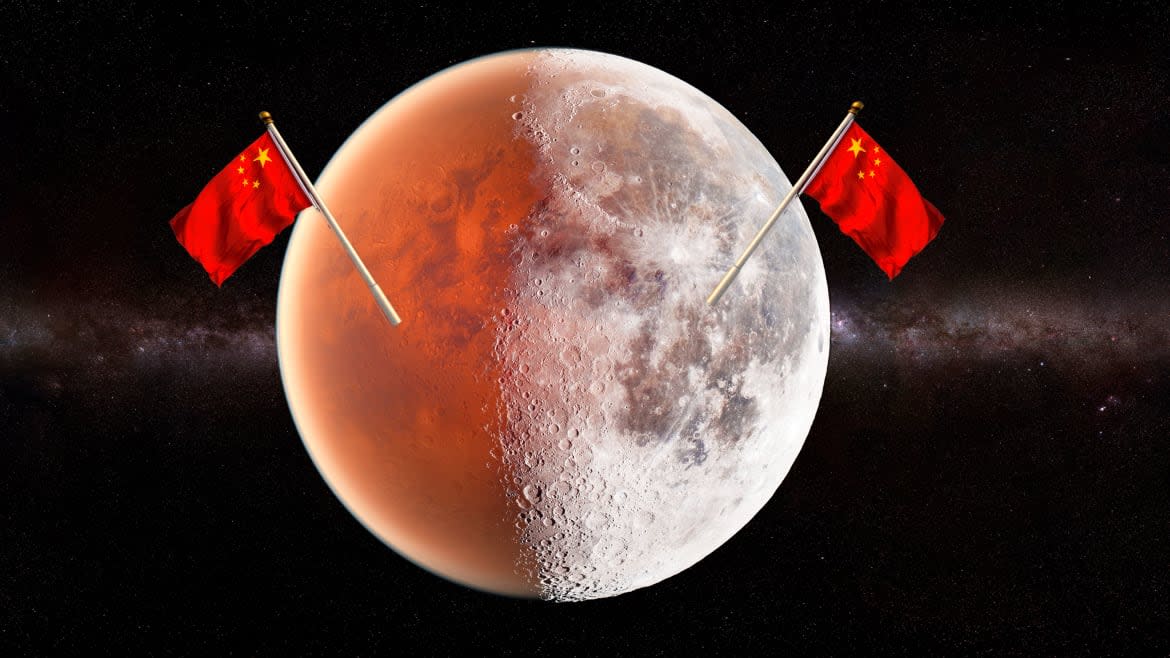China Wants to Be First to Colonize the Moon and Mars

HONG KONG—China launched its most ambitious space mission last week, with a trio consisting of an orbiter, lander, and rover loaded onto a massive rocket that is heading to Mars. The mission is an impressive scientific feat, one that is entangled with Chinese Communist Party leader Xi Jinping’s push to define China as a conquering superpower in space.
Called Tianwen-1, the Chinese Mars mission involves a seven-month journey to the red planet. When the rocket nears its destination after traveling 39 million miles, it will release the orbiter to scan and map Mars from above, while the lander will carry the rover to the planet’s surface. If everything goes according to plan and the rover maintains communication with ground control on Earth, China will be the second nation to successfully place an operational robot on Martian soil—a significant achievement for a country that is attempting to establish technological supremacy on a global and now interplanetary scale.
Yet that triumph comes loaded with CCP officials’ desire for space colonization. One senior aerospace engineer and the head of China’s lunar exploration program, Ye Peijian, indicated two years ago that his country’s designs for space expedition mirror Beijing’s plan for the South China Sea—that is, the party seeks to occupy the moon and Mars at any cost.
“The universe is an ocean, the moon is the Diaoyu Islands, Mars is Huangyan Island,” Ye said at the CCP’s annual plenary session in Beijing two years ago, referencing geological formations that are also known as Senkaku and Scarborough Shoal, and are claimed by Japan, Taiwan, as well as the Philippines. “If we do not go there now even though we can, then we will be blamed by our descendants,” Ye also said. “If others go there, then they will take over, and you will not be able to go even if you want to. This is reason enough.”
What the Hell Is China Doing on the Dark Side of the Moon?
China’s Space Force Is Way Ahead of Trump’s
The message was clear then: it’s a zero-sum game. The party’s officials see space as a place to be conquered, so they are compelled to stake a claim—fast.
China has designs to become an astral superpower. Details about state funding for space missions are opaque, but in 2018, Beijing earmarked at least $8 billion for the China National Space Administration, second only to the U.S. That amount has almost certainly increased every year since then, with Beijing hastening efforts to establish a permanent presence in space. China already has rovers on the moon. It will likely launch the core module of a space station to low Earth orbit next year. It is laying the groundwork for a crewed lunar mission in the 2030s, with plans to build a base near the lunar south pole.
And Mars? If we take Ye’s words at face value, then the plan is to seize, annex, and build on top of it.
NASA’s Perseverance Mars rover is scheduled to launch this week, on July 30. Like Tianwen-1’s as yet unnamed rover, it will hunt for carbon-containing molecules that may point to Martian life in the past, as well as collect dirt samples for scientific analysis.
After Tianwen-1 left its launchpad, NASA administrator Jim Bridenstine tweeted out well wishes, welcoming China to a small, elite group of nations that are exploring Mars. Yet it is impossible to ignore that the current confrontations between China and the U.S. look more and more like a Cold War with each passing day, and the competing space programs resemble a page out of the ideological showdown between the U.S. and Soviet Union.
Beijing and Washington have locked horns on every front. The two largest economies in the world are trapped in a spiral of tariffs. China’s military is looking to project its power in new places around the globe, grating against American spheres of influence, particularly in East Asia and the Middle East. And tech companies on either side of the Pacific Ocean are racing to one-up each other, fueled by bonfires of cash from venture capital funds that place bets on both coasts. The competition between China and the United States is multi-pronged, extending beyond the stratosphere too.
If Tianwen-1 is a success, Xi Jinping will score a major win within the party’s hierarchy, and feed the justification of his decree to remain president for life. Space exploration in any form is an inspiration, and the pride shared by Chinese people while watching a rocket built by their country fly to Mars is pure. Many young people will no doubt heed the call to build careers in STEM fields, or even dream of becoming the first Chinese person to leave footprints on another planet. But the CCP’s extra dimension of conquest taints this legacy, and even maps the potential for conflict beyond our world.
Get our top stories in your inbox every day. Sign up now!
Daily Beast Membership: Beast Inside goes deeper on the stories that matter to you. Learn more.


